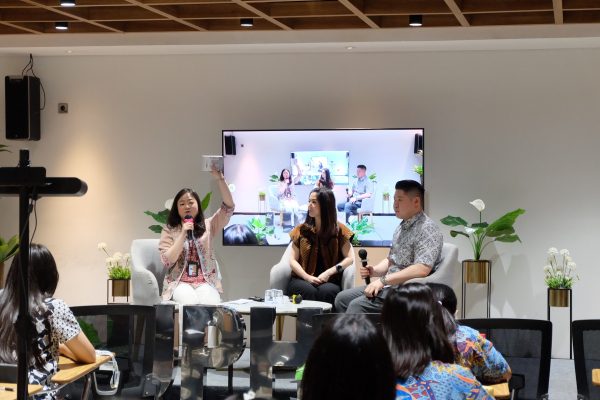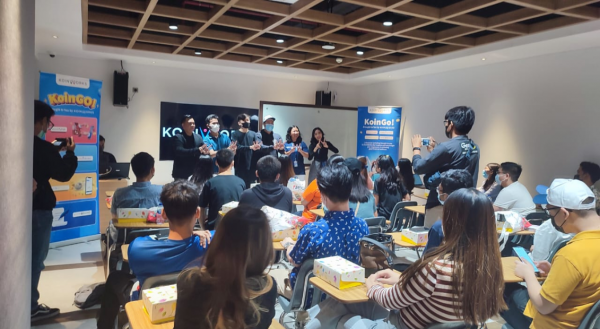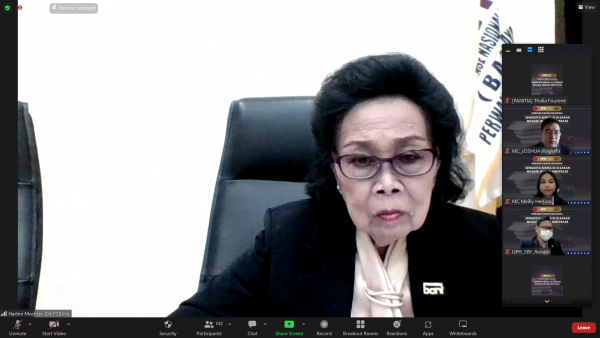2021
NATIONAL LAW WEBINAR "DOCUMENT VALIDATION: KNOWING NOTARY, LEGALIZATION, AND APOSTILLE ACTS".

On Saturday, 27 November 2021, the Student Association of Law Study Program Universitas Pelita Harapan, Surabaya Campus held a National Law Webinar entitled “DOCUMENT VALIDATION: KNOWING NOTARY, LEGALIZATION, AND APOSTILLE ACTS”. This webinar is one of the National Law Webinar series held by the UPH Law Study Program, Surabaya Campus every month.
This National Law Webinar has a theme or subject of discussion, namely the Validation of a Document, either by Legalization, Notary Deed, Warmenken, or by Apostille. These materials were presented by experts who are also Lecturers from the UPH Law Study Program, Surabaya Campus, including Dr. A A. Andi Prajitno, Drs., S.H., M.Kn who works as a Notary and PPAT in Surabaya, and Dr. Paula, S.H., M.Kn., M.H. who works as a Notary and PPAT in the city of Lamongan.
This webinar was guided by Moderators, namely Joshua Evandeo Irawan, SH, MH (Lecturer of the UPH Law Study Program, Surabaya Campus) and Richie Sanjaya Putra (Vice Chair of the Law Study Program Student Association UPH Surabaya Campus. There were approximately 175 participants who attended, from various regions in Indonesia, broadcasting from Manado, Kupang, Bali, and various other regions in Indonesia. This webinar was also attended by various groups from Academics, Notary Practitioners, and various elements of society and even from the government.
This webinar was opened with remarks from Mrs. Dr. Agustin Widjiastuti, S.H., M. Hum. as the Head of the Law Study Program, UPH Surabaya Campus who explained the basis and direction of this Webinar.
The first session was presented by Dr. Paula, S.H., M.Kn., M.H., who works as a Notary and PPAT in the city of Lamongan and a Lecturer from the UPH Law Study Program, Surabaya Campus. In this first session, Dr. Paula discussed Legalization, Notary Deed and Warmenken in approximately 30 minutes. The discussion starts from the basic material about the Law of Agreement, then the forms of agreement, what is the difference between an Underhand Deed and a Notary Deed, then enters the Legalization of a document or agreement, and ends with an explanation regarding Warmenken.
After the explanation of the material for the first session was completed, the event continued in a Question-and-Answer Session (QnA) for the first session with Dr. Paula. There are approximately 5 questions from participants addressed to Dr. Paula, including questions about Document Legalization, how to register an underhand deed to become a notary deed, and about the career of a notary. Dr. Paula answered all questions in a concise, clear, and detailed manner so that the participants were satisfied with the answers from Dr. Paula, the question-and-answer session is over in 10 minutes.
The second session was presented by Dr. A A. Andi Prajitno, Drs., S.H., M.Kn. , who works as a Notary and PPAT in the City of Surabaya and a Lecturer from the UPH Law Study Program, Surabaya Campus. In this second session, Dr. Andi discussed the Apostille Public Documents. Submission of Material by Dr. Andi approximately 30 minutes. The discussion starts from the basic material regarding the Apostille convention, the purpose of the Apostille, the benefits of the Apostille, and how Public Documents can be made Apostille. In addition, Dr. Andi also discussed the attitude of the Indonesian government regarding the Apostille convention through Presidential Regulation Number 2 of 2021 concerning Ratification of the Convention Abolishing The Requirement of Legalization for Foreign Public Documents (“Perpres No. 2/2021”).
After the explanation of the material for the second session was completed, the event continued in a Question-and-Answer Session (QnA) for the second session with Dr. Andi. There are approximately 3 questions from participants addressed to Dr. Andi, including questions about the Apostille, Public Documents made by Apostille, to questions about the legal basis used by the Indonesian government in responding to the Apostille convention. Dr. Andi answered all questions in a concise, clear, and detailed manner so that the participants were satisfied with the answers from Dr. Andi. Not only that, Dr. Andi also showed a scan of the Apostille convention document obtained from the Indonesian Ministry of Law and Human Rights. The Q&A session was over in 10 minutes.
All participants were very enthusiastic in participating in this webinar. This can be seen from the number of questions entered in each session which will then be responded to by the speaker after the presentation of the material is complete. Hopefully this webinar that has been held can provide good education for all participants, especially in the scope of knowledge of Civil Law and Notary Law.
Don’t forget to join in other programs from the Law Study Program at Pelita Harapan University, Surabaya Campus. We will continue to hold events which of course can increase the knowledge of Law to the Indonesian people.
Regards



